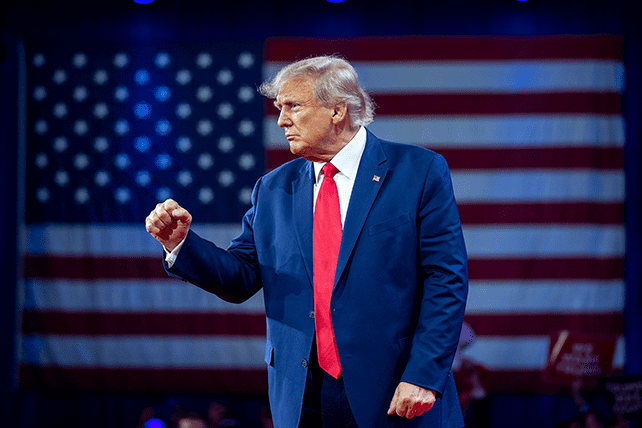Indeed, for all their differences, integralism shares many of the same policy goals as popular forms of Christian nationalism. Referring to Christian nationalism as “bargain store integralism,” Vallier said the two movements generally find common cause when it comes to opposition to abortion and support for blasphemy laws, blue laws and banning pornography.
And for Trump.
“All of these vectors converge at Trumpism,” said Steven P. Millies, professor of public theology at the Catholic Theological Union.
Many prominent integralists and hard-line Christian nationalists ultimately share support for Trump, whom Vermeule has likened to Hungarian Prime Minister Viktor Orban. Vallier has stated previously that integralists once viewed Trump as a figure similar to Constantine.
Support for Trump is foundational for hard-core Catholic Christian nationalists. People waving flags branded with the America First logo were among the first to enter the Senate chamber during the Jan. 6, 2021, attack on the U.S. Capitol (Fuentes himself did not enter the Capitol that day). Fuentes, meanwhile, often uses extreme rhetoric widely decried as racist and antisemitic on his various internet livestreams, such as calling for “Catholic Taliban rule.”
There are also prominent Catholics who champion forms of Christian nationalism that are fairly indistinguishable from Protestants who have rallied around Trump. This includes former Trump adviser Michael Flynn, a Catholic who has headlined a traveling Christian nationalist roadshow known as the ReAwaken America Tour and promoted Christian nationalist organizations. Similarly, onetime Trump aide Steve Bannon, who is also Catholic, has identified himself as a “proud Christian nationalist” and described the U.S. as a “new Jerusalem.”
But according to Millies, Christian nationalism is “a little imprecise” for assessing some trends within politicized conservative Catholicism, particularly “extra-ecclesial groups” that operate outside of official Catholic authority. He pointed to the controversial (and recently defunct) media group Church Militant, as well as Eternal Word Television Network, a massive, conservative-leaning Catholic media conglomerate based in Alabama.
Millies also noted the heightened profile of “influencer bishops” such as Bishop Joseph Strickland, who built a robust conservative following while taking up causes such as opposition to COVID-19 vaccines. These movements and leaders often converge, Millies said, around Trump: Church Militant and EWTN have long been accused of bolstering the former president’s positions on issues such as immigration, and Strickland offered a prayer at a faith-themed event held in the lead-up to the Jan. 6, 2021, attack on the U.S. Capitol.
These groups and figures would not necessarily describe themselves as Christian nationalists, Millies said. But they have “figured out that they can appropriate a Catholic brand” and raise “a remarkable amount of money” while “selling a very patriotic-seeming message that tells a story about the happy and uncomplicated meeting between Catholic faith and the American style of constitutional government.”
“The outsized influence of these lay Catholics is a new kind of problem for a church that wants to retain its control over the meaning of what the word Catholic is,” Millies said.
None of these movements is operating under the endorsement of the Vatican. Most are actively in tension with church leaders, operating outside the church hierarchy, or both. Church Militant was asked by a local diocese to strip “Catholic” from its name early in its existence, for instance, and EWTN is said to have attracted thinly veiled criticism from Pope Francis himself: The pontiff is believed to have been referring to EWTN when he decried the “work of the devil” in 2021. Meanwhile, Strickland, despite his fame in conservative circles, was chastised by Vatican leaders before eventually being removed from his diocese late last year.
At least one U.S. bishop has also spoken out against Catholics who invoke these ideologies.

